So when I was there it was great. However instead of building on that success. They just try and force you back into the rat race. Send you to Boston a city, with the goal of finding a job. I actually am one of the few who found a job, paying a decent wage. However I am mise ...
About Gould Farm
This is a working farm with 750 acres of beautiful land and comfortable living quarters that allow residents to support each other while receiving the support and confidence they need to live a fulfilling and productive life.
There are three guest houses with shared living spaces and bathrooms. Each resident has a private bedroom, though there is support available day and night, with a resident advisor available in each house overnight.
This is not just a place to go to learn how to work on a farm, though clients do gain life and job skills through the Gould Farm work program. There are many support, treatment, and therapy options to create the most effective personal treatment plan for each resident.
Therapy philosophies that are integrated into care may include cognitive (CBT) and dialectical behavior therapy (DBT), mentalization based treatment, internal family system therapy, and other modalities of evidence-based treatment. There are also many group therapy opportunities including skills groups, recovery and appropriate AA, NA, or MA groups. Polyvagal, transition skills and challenging stigma groups are all a part of developing the life skills to succeed in life and therapy goals.
Residents spend approximately 5 to 6 hours a day working on the farm after they get settled into the program. There are also scheduled therapy and group activities throughout the week. Recreation and fun activities are a part of life at Gould Farm and individuals have relaxation time, too.
Gould Farm accepts clients who are 18 or over. They do not accept anyone who has a primary diagnosis of dementia or significant cognitive impairment, substance abuse, or an eating disorder. They also don’t accept anyone who has a history of sexual offenses, arson, or ongoing violence. Clients should not have any unresolved legal issues before the courts at the time of admission.
They do accept insurance, but it is usually only secured after a medical necessity letter is obtained. It’s important that you check with your personal health insurance provider to verify what coverage you have, whether you are in-network, and if there are any financial obligations that you’ll be responsible for when in treatment.
Facility Overview
Latest Reviews
Rehab Score
Gallery
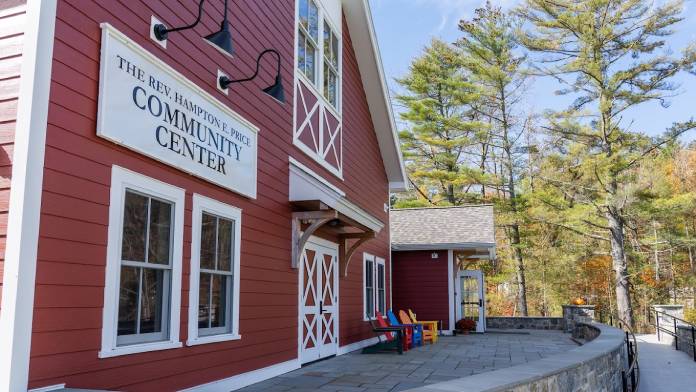

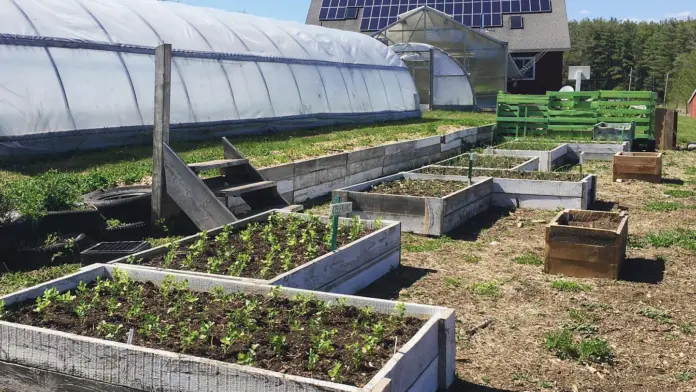
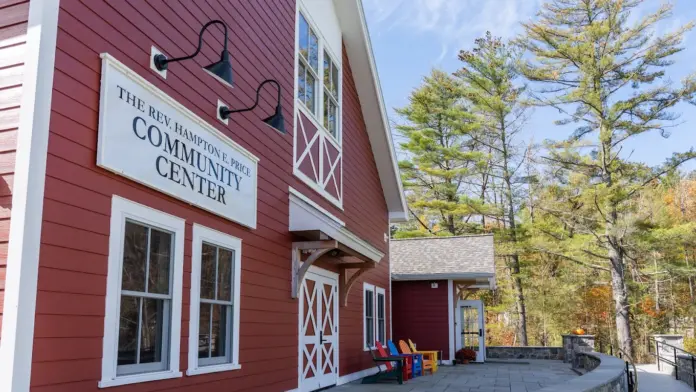
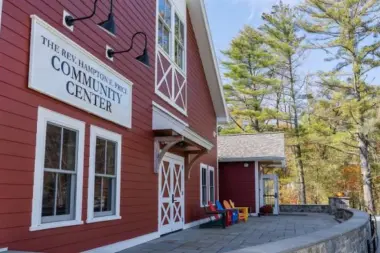


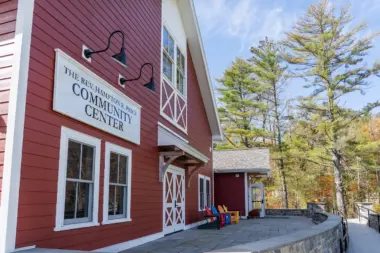
Other Forms of Payment
Private insurance refers to any kind of healthcare coverage that isn't from the state or federal government. This includes individual and family plans offered by an employer or purchased from the Insurance Marketplace. Every plan will have different requirements and out of pocket costs so be sure to get the full details before you start treatment.
Self-pay involves paying for treatment out of your own pocket. You can use savings or credit, get a personal loan, or receive help from family and friends to fund your treatment. If you don't have insurance or your insurance plan doesn't cover a specific program, self-pay can help ensure you still get the care you need.
Financial aid can take many forms. Centers may have grants or scholarships available to clients who meet eligibility requirements. Programs that receive SAMHSA grants may have financial aid available for those who need treatment as well. Grants and scholarships can help you pai for treatment without having to repay.
Sliding scale payments are based on a client's income and family size. The goal is to make treatment affordable to everyone. By taking these factors into account, addiction recovery care providers help ensure that your treatment does not become a financial burden to you or your family, eliminating one barrier to care.
Addiction Treatments
Levels of Care
Outpatient Programs (OP) are for those seeking mental rehab or drug rehab, but who also stay at home every night. The main difference between outpatient treatment (OP) and intensive outpatient treatment (IOP) lies in the amount of hours the patient spends at the facility. Most of the time an outpatient program is designed for someone who has completed an inpatient stay and is looking to continue their growth in recovery. Outpatient is not meant to be the starting point, it is commonly referred to as aftercare.
Residential treatment programs are those that offer housing and meals in addition to substance abuse treatment. Rehab facilities that offer residential treatment allow patients to focus solely on recovery, in an environment totally separate from their lives. Some rehab centers specialize in short-term residential treatment (a few days to a week or two), while others solely provide treatment on a long-term basis (several weeks to months). Some offer both, and tailor treatment to the patient's individual requirements.
Intensive outpatient programs (IOP) facilitate clients' sustained sobriety through high-level care aligned with their evolving needs. Clients engage in multiple treatment sessions per week, typically receiving between nine and 20 hours of outpatient care weekly. The frequency and intensity of treatment gradually decreases as clients stabilize. Many intensive outpatient rehabs offer a variety of services, including addiction counseling, recovery-focused life skills training, and medication assisted treatment (MAT). Evidence-based complementary therapies are also common.
A sober living home offers a supportive environment where individuals in recovery provide mutual support as they share household responsibilities. Residents participate in 12-step programs and offer accountability for sobriety. To remain in men's or women's sober living, individuals must remain drug and alcohol-free, contribute to chores, attend support group meetings, and help cover expenses to live in the home.
Medically supervised detox is the process of removing addictive substances from your body and managing the withdrawal symptoms in a medically supervised environment. Typically, this is the first step in the recovery process and lasts an average of 5-7 days, though the length can vary depending on your individual needs. Once your system is cleared of alcohol and drugs, you'll likely transition to an inpatient treatment program for the next phase of your recovery.
Treatments
Many of those suffering from addiction also suffer from mental or emotional illnesses like schizophrenia, bipolar disorder, depression, or anxiety disorders. Rehab and other substance abuse facilities treating those with a dual diagnosis or co-occurring disorder administer psychiatric treatment to address the person's mental health issue in addition to drug and alcohol rehabilitation.
Mental health rehabs focus on helping individuals recover from mental illnesses like bipolar disorder, clinical depression, anxiety disorders, schizophrenia, and more. Mental health professionals at these facilities are trained to understand and treat mental health issues, both in individual and group settings.
Programs
Adult rehab programs include therapies tailored to each client's specific needs, goals, and recovery progress. They are tailored to the specific challenges adult clients may face, including family and work pressures and commitments. From inpatient and residential treatment to various levels of outpatient services, there are many options available. Some facilities also help adults work through co-occurring conditions, like anxiety, that can accompany addiction.
Young adulthood can be an exciting, yet difficult, time of transition. Individuals in their late teens to mid-20s face unique stressors related to school, jobs, families, and social circles, which can lead to a rise in substance use. Rehab centers with dedicated young adult programs will include activities and amenities that cater to this age group, with an emphasis on specialized counseling, peer socialization, and ongoing aftercare.
Clinical Services
Cognitive Behavioral Therapy (CBT) is a therapy modality that focuses on the relationship between one's thoughts, feelings, and behaviors. It is used to establish and allow for healthy responses to thoughts and feelings (instead of unhealthy responses, like using drugs or alcohol). CBT has been proven effective for recovering addicts of all kinds, and is used to strengthen a patient's own self-awareness and ability to self-regulate. CBT allows individuals to monitor their own emotional state, become more adept at communicating with others, and manage stress without needing to engage in substance abuse.
Group therapy is any therapeutic work that happens in a group (not one-on-one). There are a number of different group therapy modalities, including support groups, experiential therapy, psycho-education, and more. Group therapy involves treatment as well as processing interaction between group members.
In individual therapy, a patient meets one-on-one with a trained psychologist or counselor. Therapy is a pivotal part of effective substance abuse treatment, as it often covers root causes of addiction, including challenges faced by the patient in their social, family, and work/school life.
Couples therapy in Massachusetts is a short term therapy designed to equip you both with the skills you need to address conflicts and challenges in your relationship. During sessions, your counselor may meet with you individually and together.
During family therapy, the therapist works with every member of the family unit to understand the role they play in their loved one's addiction. By addressing these patterns, family members learn healthier ways to interact with each other and contribute to a more effective recovery journey for the family member who is addicted.
There is a strong link between nutrition and addiction. That's why drug rehab in Massachusetts includes nutrition therapy to teach you healthy eating habits that support addiction recovery. You'll learn what foods your body needs for healing and long term health.
Amenities
-
Residential Setting
-
Private Rooms
-
Farm Setting
-
Gardens
-
Walking Trails
Staff & Accreditations
Staff

Jane Linsley, LICSW LADC1
Clinical Director

Lisanne Finston, MSW MDiv
Executive Director
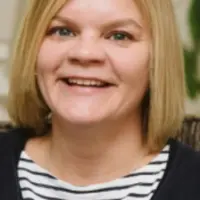
Tamara McKernan, LICSW
Admissions Director
Accreditations

State Licenses are permits issued by government agencies that allow rehab organizations to conduct business legally within a certain geographical area. Typically, the kind of program a rehab facility offers, along with its physical location, determines which licenses are required to operate legally.
State License: Massachusetts
Contact Information
100 Gould Road
Monterey, MA 01245